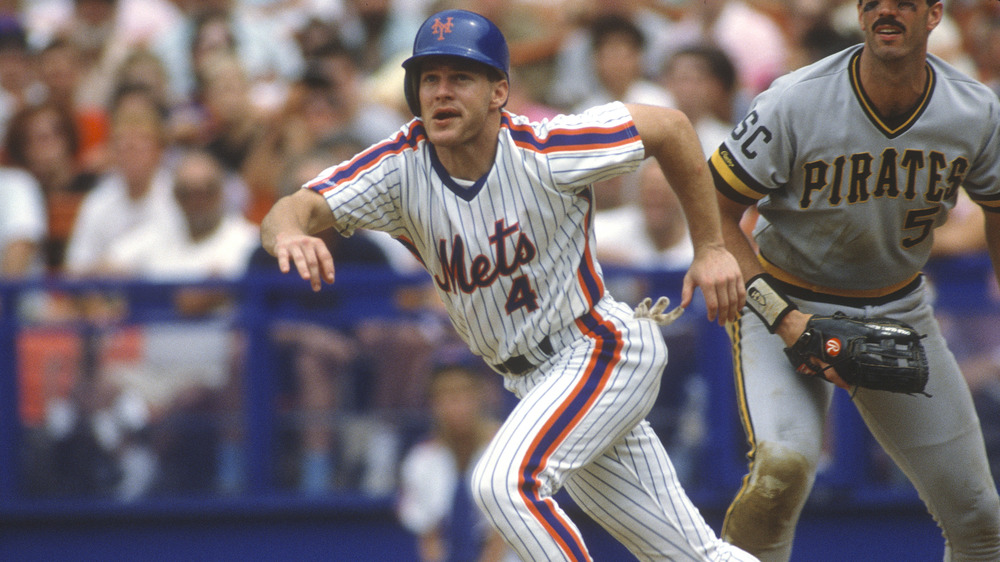How Lenny Dykstra Ended Up With No Money
For many New York and Philadelphia-based baseball fans of a certain age, Lenny Dykstra was a superstar. Short and stocky, Dykstra had to push past a lot of scouts who thought he was too small to make an impact on the game, but when he began playing regularly for the New York Mets in 1986, he quickly earned the nick-name "Nails." Dykstra played hard. He ran into walls, he belly-flopped into bases, he took injuries in stride. The Mets won the World Series, and Dykstra made the short list for MVP voting.
When he was traded to the Phillies in 1989, he bulked up. According to Baseball Reference, in 1990 he batted .325, led the league in hits, and scored 106 runs on a fourth-place team. Dykstra was plagued by injuries, but in 1993 he had the best year of his career, hitting .305 with 19 home runs and leading the league in runs scored, hits, and walks. He came second in the MVP-voting, and the Phillies went to the World Series.
His injuries caught up with Nails and he retired in 1996 at age 33. He'd earned $24 million playing baseball and launched a surprisingly successful post-baseball career. He invested in a chain of car washes. He invested aggressively and surprisingly successfully. According to The Philadelphia Inquirer, Dykstra's net worth in 2008 was $58 million.
Today, he's broke. Here's how Lenny Dykstra ended up with no money.
He became an addict
It's not unusual to find drugs at the core of a riches-to-rags story. Not only are illegal drugs expensive, they take a toll on anyone's mental and physical health. In other words, you just don't make good decisions while high.
According to Newsday, Dykstra's abuse of prescription drugs began in his playing days. When he appeared in court to face charges of fraud and money laundering in 2012, papers filed with the court acknowledged that as a player, Dykstra regularly used Dexedrine, Adderall, and Vicodin. Considering how often Dykstra was injured, it's not terribly surprising he used painkillers and other drugs to get by. After his playing days were over, however, he continued to abuse drugs. The same court filings admit that once retired he switched to alternative painkillers, most notably Percocet.
Dykstra had long battled an alcohol problem as well. The New York Times reports that in 1991 Dykstra crashed his car, injuring himself and teammate Darren Daulton, and was found to have twice the legal limit of alcohol in his blood. In the court papers filed in 2012, Dykstra admitted to drinking a liter of vodka a day. He was eventually sentenced to three years in prison.
Lenny didn't learn much from his prison stint. The Morning Call reports he was arrested again in 2018 and charged with cocaine and methamphetamine possession.
His brother ratted him out
Dykstra came up through the Mets organization as a skinny, scrappy player nicknamed Nails because of his hard-driving playing style. In the mid-1990s he suddenly ballooned into a muscle-bound power threat. If you think steroids might have had something to do with that, you would be right. As NBC Sports reports, Dykstra knew that 1990 was his last year to make it. If he didn't prove he was a superstar, he would soon be out of baseball. So he did some research and he bulked up the artificial way.
Fast-forward to 2005, and the infamous Mitchell Report. Baseball was trying to clean up its image, and so it asked former Senator George Mitchell to investigate and file a report on steroid use in the sport. According to The New York Times, one of the people who gladly cooperated with Mitchell and spilled the tea was Kevin Dykstra, Lenny's brother and former business partner. Kevin outed Lenny's steroid use and ruined his reputation because Lenny was deep into the process of alienating his family and friends.
Kevin was bitter because Lenny had recently pulled his money out of the car wash business they ran together against Kevin's wishes, and then never paid him the $4 million he was owed. Lenny's own mother was embittered by the way he'd treated her, saying, "He screwed us all out of money. He didn't do right by his family and we've kind of disowned him."
He got greedy
Despite all of his problems, Dykstra seemed to be doing very well for himself. Before pulling his investment, The New York Times reports Dykstra earned $1 million a year from his car wash business, and his net worth was $58 million.
And then he became a stock picker. As Forbes notes, Dykstra was a favorite of television's Jim Cramer, who paid Dykstra to write a column for TheStreet.com. Dykstra was actually very good at this. His picks usually went well — people had to pay nearly $1,000 a year to read Dykstra's advice.
Then Dykstra basically got greedy. According to Cramer, Dykstra did well when he focused on relatively modest gains, but got into trouble when he started to chase big windfalls. Then Dykstra imagined he could be a media giant, and launched a glossy magazine in 2008 called Player's Club, aimed at pro athletes and delivered for free to clubhouses. Forbes notes he managed to get one issue out before the whole thing fell apart due to lawsuits and unpaid bills. To cover everything up, he began using his own employee's credit cards for his lavish spending.
Even when he filed for bankruptcy he tried to keep things going. Newsday reports Dykstra admitted to stealing assets from his own estate and selling memorabilia without disclosing the profits. That earned him a stint in jail, and put the final nail in his financial empire.



